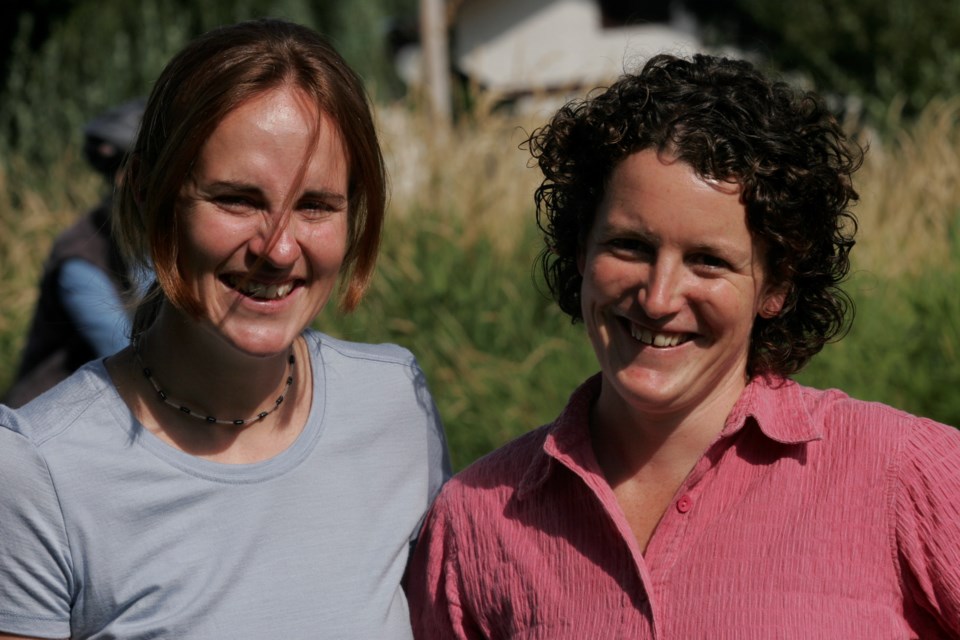When the first Slow Food Cycle Sunday came onto the scene in 2005, founders Anna Helmer and Lisa Richardson weren’t sure what they had on their hands.
“Lisa and I had been talking about how many maps to print out,” recalled Helmer, whose family has farmed in the Pemberton Valley for more than a century. “We started with like, 40 or something, and then thought, “Maybe we should go to 100.” And for the actual event day, we did 150.
“And then 400 people registered.”
The combination of bicycles, food and farmland proved irresistible. Over the next decade, thousands of riders would flock to the Valley each August to pedal the flat, scenic stretch of Pemberton Meadows Road and stop along the way to taste what the valley had to offer.
But the ride was also born out of something deeper than summer fun.
At a 2005 public meeting about the Rocky Mountaineer train, Richardson recalled a consultant dismissing Pemberton as a place with “nothing worth stopping for.” For local farmers and small business owners who saw the train as a chance to reach new visitors, it stung. For Helmer and Richardson, it became a challenge.
“It was kind of a blow,” Richardson said. “But I met Anna there, and we started brainstorming. We realized Pemberton doesn't have a signature event. And at the same time, we asked, ‘What do people not understand about Pemberton?’”
For Helmer, the answer was simple: consumers, disconnected from the people growing their food, weren’t aware of the development pressures farmers faced. For Richardson, the event would be about learning a little more about the people behind the produce.
“Anna was like, “It’s about farmland and I want to protect farmland,” recalled Richardson. “And I reflected the perspective of the more urban person who has no real relationship with where their food comes from.”
It proved to be a potent combination. The first year’s success was a revelation, and the momentum snowballed.
“The next year, I was heading in to the start of the ride and seeing like, vehicles loaded with bikes pulling into town looking for somewhere to park,” recalled Richardson. “I was like, ‘Oh, hang on a second here.’”
‘A mutual appreciation event’
Richardson remembers being worried about how much of a departure the event would be from the quiet farming status quo in the Valley.
“Pemberton didn't have a farmers' market at the time and there were no harvest boxes, so it was a really radical idea,” she recalled. “I don't know what it was like for Anna to convince people, like, ‘Come and let people on your farm and let them see what's happening on your property.’”
Helmer agreed it was a big ask.
“As a farmer, you're generally really dirty and hot and the last thing really that you can handle is somebody wandering down the driveway that wants to have a look around and ask a lot of questions. It's very counter-intuitive," she said. “But on Slow Food Cycle Sundays, it totally works; people are welcome in the valley and welcome to come down the driveway. And I think most farmers are feeling that love and that appreciation and are also appreciating that there are people making an effort to come out here.
“It’s a mutual appreciation event, is what it is."
Still, sustaining the event has been far from simple. Feeding thousands of cyclists in a single day is a logistical challenge for small farms. Some years brought rainstorms or wildfires that forced cancellations. A few years in, Richardson’s other writing and public relations roles took her away from her Slow Food duties. A few years back, Helmer also stepped back from organizing.
"I just thought, 'There’s 4,000 people coming down [our] driveway, and I’m here in town parking cars,'” said Helmer. “All of a sudden, I was like, Oh my God, this can’t go on." Handing the reins to Tourism Pemberton and professional event managers allowed the cycle to keep rolling and for Helmer to meet with those guests on the Slow Food Sunday.
‘Inner farmers’
The organizers said Slow Food Cycle’s most enduring contribution—even moreso than giving the Village its signature event—is the relationships it has fostered between farmers and their own community. The annual Sunday event has helped farmers understand the degree to which their work is appreciated, and given attendees a glimpse into the farm life that used to be the norm for a much larger contingent of the population.
“It's not been that very many generations since everybody worked on a farm, or had a relation on a farm, [or] spent summers on a farm,” explained Helmer. “And I know how much I feel strongly attached to the land, and I think tons of people do feel really strongly attached to land, but don't have the opportunities to get in touch with their inner farmers. And I think we can offer that.”
Richardson says the event’s legacy also belongs to unsung contributors who kept it alive year after year. She points to Nikki Vankirk, Helmer’s partner, who “stepped in around year two or three in a really hands-on way,” and artist Lisa Ankeny, who designed the original logo still in use today.
Two decades after its modest beginnings—and having potentially outlasted the Rocky Mountaineer that refused to stop in the Village way back when—Slow Food Cycle remains a Pemberton institution.
“It was a special event,” Helmer reflected. “And I’m really proud to still be associated with it. We're all in this together—even though we're in different worlds.”




